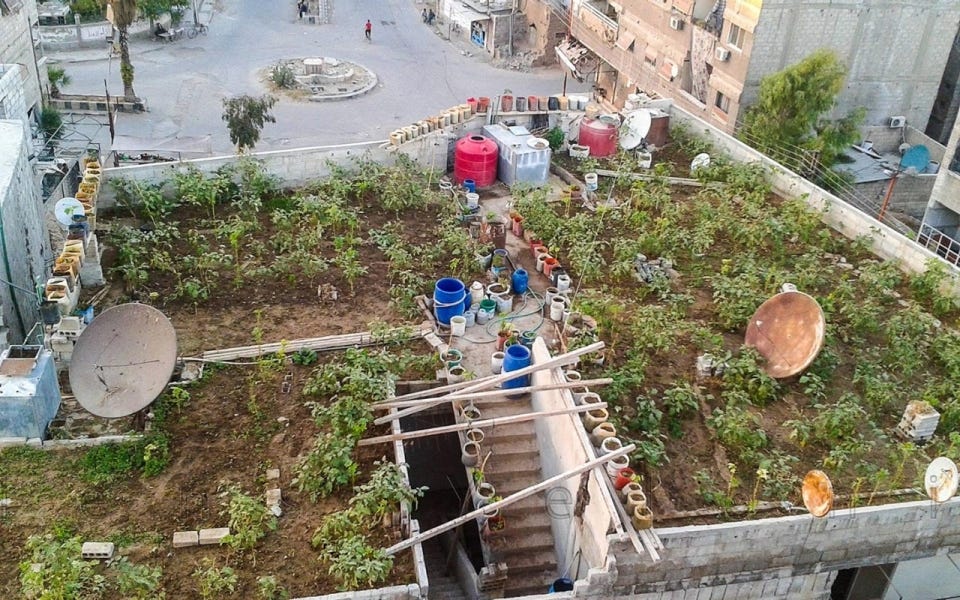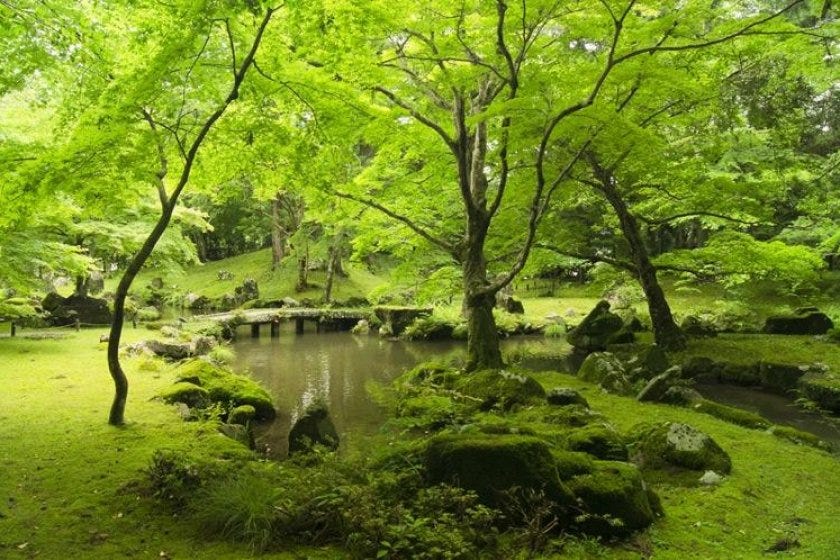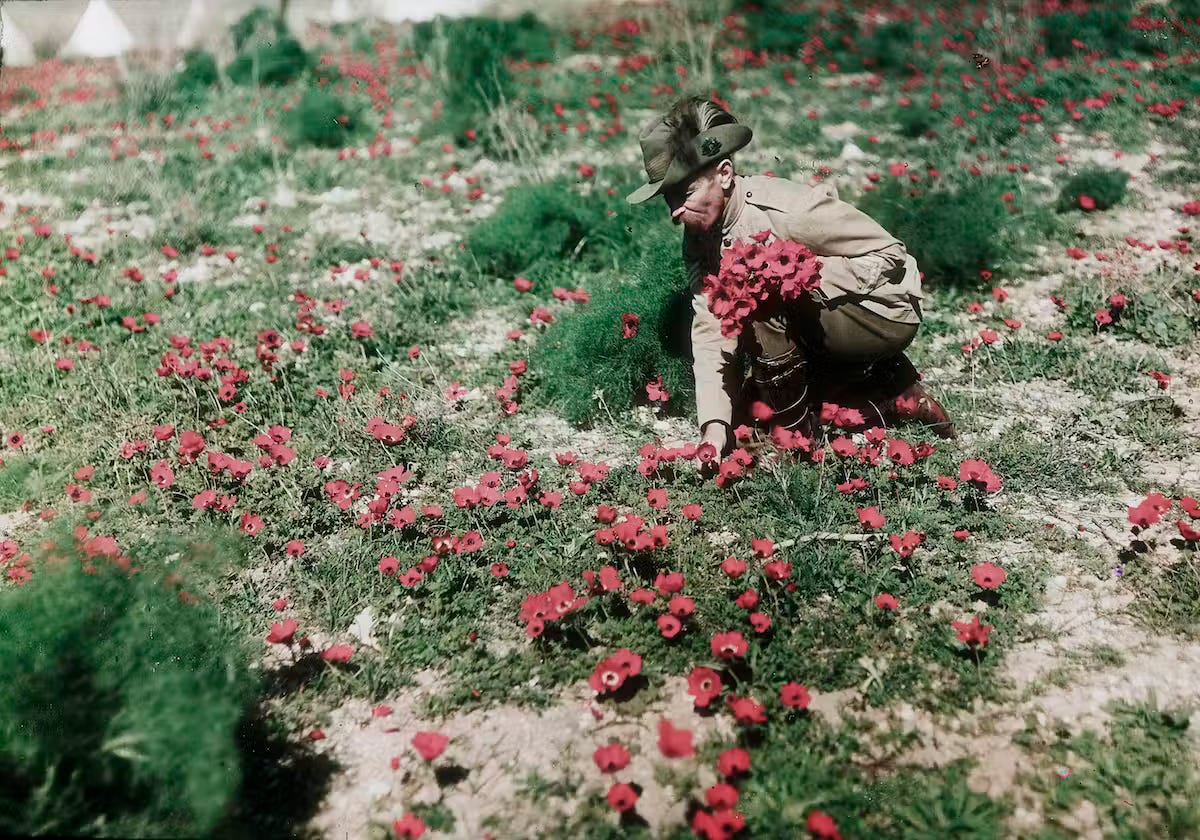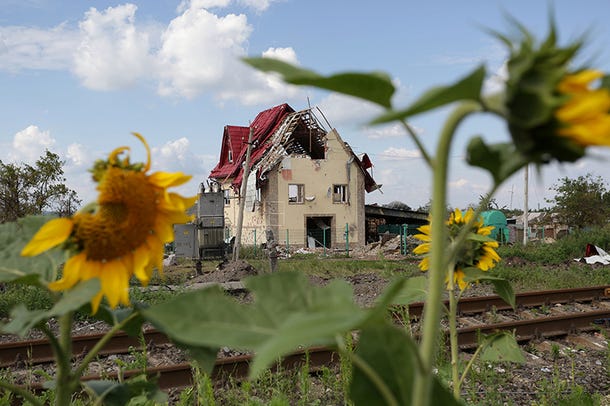Humans have a huge capacity for kindness, nurturing and forgiveness, but also a proclivity for violence when we feel that our survival is under threat. None of us is a single facet, we are many things simultaneously. So, even in times of destructive conflict when trauma threatens our humanity, nature and cultivation can work to rebalance us. Rebuilding our connections to others; healing our minds and bodies. This is the paradox of War and Gardening.

Inspiration
I first read Sue Stuart-Smith’s fascinating book, The Well-Gardened Mind a few years ago. It felt like a confirmation of what I and many others had experienced first-hand, the uncanny ability of gardening to heal. As I reread it this past week, it was the chapter on War and Gardening that sent me down a rabbit hole of sorts. It just seemed to jump off the pages and inspire some deeper independent research. It wasn’t lost on me that, in a time when we’re all searching for ways to create meaningful change on many fronts, the simple act of gardening could be just what we need.

Ancient Philosophies
“Social historians hardly ever mention gardens or gardening, and garden historians have little to say generally about politics.”(Martin Hoyles)
Usually we see gardens as separate spaces, free of conflict. But In actual fact, these seemingly opposite pursuits have been linked in many cultures over the centuries.
As Sue states, “In the great civilizations of Mesopotamia the skills involved in combat and cultivation were given equal weight.”
While, “Many Japanese warriors were taught both. To prepare for battle AND tend to a garden. To balance a man’s ego. A man always at war, can lose touch with his nurturing side. And forget how to BE with others when not in battle.” (D Kuhnle)
In fact, Zen gardens were once championed by the samurai warrior class. The simplicity of the space required one to leave behind distractions and concentrate on self-discipline. The acts of sweeping, raking and cultivation offered meditative movement that focused the mind and helped to find a warrior’s true self through spiritual awakening.
These cultures are not alone, down through the years and even today, we see a connection between gardening and war zones.
Simple Acts
“small pleasures must correct great tragedies, therefore of gardens in the midst of war I boldly tell”. (Vita Sackville-West)
Conflict has a way of stripping life down to essentials, where small acts can make a big difference. A moment of joy or defiance, however minute can build a connection where one is missing.
Joy
Have you ever wondered why a small gift of flowers is always appropriate? Why they’re certain to bring a smile, even amidst the worst situations? Well, that reaction actually has a name, the Duchenne smile. It happens, that when we see flowers there is a completely genuine and involuntary emotional response that we all share. Our eye and mouth muscles move in unison, as our bodies release hormones. Including,
Oxytocin, which induces bonding and connection (as happens during breast feeding).
Dopamine, the happiness hormone, that rewards your brain (like when you dance or listen to music).
Serotonin, that helps regulate mood (and effects things like sleep and wound healing).
Endorphins, that lower stress and enhance well-being (these are also released during exercise).
And, all of this happens in the blink of an eye, without you even being aware.

It’s also important to note that these Duchenne smiles can also boost the mood of those around you. There is an instantaneous chain reaction. Suddenly, you are seen as approachable, cheerful and trustworthy, less stressed, more productive and a generally happier person.
“British researchers found that one smile can generate the same level of brain stimulation as up to 2,000 bars of chocolate.” (Ron Gutman)
Resistance
Gardening in war can also become an act of defiance, something radical. It takes courage and hope, in order to cultivate land for sustenance, beauty and respite, in spite of trauma and destruction. Gardens have and can be found in internment camps, ghettos, war zones and occupied nations. The act of cultivation is something that we’re drawn to instinctually. It can be both a form of self-soothing, nourishment and protest at the simultaneously.
Trauma Responses
The human psyche responds to trauma by controlling emotions and activating a physical survival response (fight or flight). This is very effective in the short term, it’s what helps us to survive in many instances. But, during lengthy conflicts and extremely traumatic events, it can become hyperactive. In this state (PTSD), our minds become disoriented, disorganized and easily overwhelmed. We are disconnected and isolated from the world around us. Unable to make sense of it, or our place in it. We are hypersensitive to sensory triggers; stuck in a loop of trauma, anger and depression.
Gardening can help to break this cycle, create links to the world and disengage triggers. In wartime, they offer food security, better nutrition and self-sufficiency. A connection to the natural world and a reminder that we are a part of it. A simple reminder that there is a larger system going on around us; the seasons will continue to cycle, plants to grow and that there is hope.
Homefront Connections
Outside of the conflict zone, gardens can become a means to contribute to the larger effort in a meaningful way and offer support from afar. Victory or Liberty gardens for instance, were popular during WWII. Where homefront food production was encouraged in every open space, as a way to be self-sufficient and safe resources for the troops. School yards, parks, lawns and public spaces were all plowed and planted in community wide efforts.
It was also common for loved ones to send care packages containing seeds to the front lines. Highly transportable and easily grown, they served as a reminder of home. Sharing love and support, plus the tastes and sights of better times. Also providing a commodity that could be traded and shared, building additional trust and connections among troops and civilians alike.
Post Conflict
Once physical safety has been reached, gardens can also hugely impact post traumatic healing. They offer refuge.
Gardens are transitional, they physically sit in between our indoor and outdoor spaces and mentally between our inner and outer lives.
Being in a place where we know that we are safe, we can begin to listen to our bodies again. Free of judgement and shame, we can let our guard down and just BE. Plants don’t show emotion in the same way that humans do, there is no fear and no visible pain.
We can slowly rebuild connections, interacting and sharing in something that is outside the human experience, that’s greater than ourselves.
Did you know that even watching someone else garden can stimulate everything but movement in the body. So, you get all of the mental and hormonal benefits even if you’re not able to participate in the physical actions yourself?
There are even bespoke gardens, designed for low sensory stimulation, mindful of those that are easily triggered. Remember those specialized Zen gardens?
Beyond that Duchenne smile effect, gardening outdoors has added benefits.
Sunlight is antibacterial, produces vitamin D and helps to build strong bones.
Sun-skin contact releases serotonin.
bacteria in soils, aids immune response, gut and skin health. While boosting serotonin and lowering cortisol (stress hormone).
The brain-hand connection is engaged, releasing serotonin while also suppressing cortisol.
We learn concentration and patience, and gain confidence. Social interactions become easier and more relaxed when we share tasks and engage in a neutral space. We are all equal in the eyes of plants, free of societal roles.
In Action
If you wish to seek help, volunteer or support an organization that speaks to you, please do. There are many that promote peace and healing through gardening.
To learn more about Horticultural Therapy (HT) or therapeutic gardening, locate an association near you.
Sara-Jane at Virens Studio
Virens is a Vancouver, Canada based studio. We specialize in Eco Landscape & Planting Design + Urban Greening. Please get in touch today to discuss our work, garden writing or collaborations.









